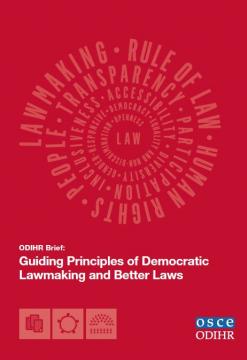Resources
ODIHR Brief: Guiding Principles of Democratic Lawmaking and Better Laws

Given the ongoing erosion of democratic and constitutional standards and the rule of law across the world, and declining public trust in democratic institutions, it is essential to strengthen democratic institutions and processes by promoting openness, transparency, inclusiveness and accountability in lawmaking. Contemporary lawmaking displays a number of weaknesses, including a lack of proper policy discussions, impact assessments or public consultations before drafting a law and the practice of sidelining democratic institutions throughout the legislative process. In principle, lawmaking procedures and practices should follow democratic principles, adhere to the rule of law and comply with international human rights obligations and standards. A democratic lawmaking process not only leads to better laws but usually improves the implementation of the adopted laws, ultimately enhancing public trust in democratic institutions and processes.
To address these weaknesses, ODIHR is developing the Guidelines on Democratic Lawmaking for Better Laws, which consists of an overview of the Guiding Principles of democratic lawmaking followed by concrete and practical recommendations on how these guiding principles can be adhered to at each stage of the legislative cycle to achieve good quality laws, based on key rule of law and human rights standards. This Brief highlights some of the key concepts contained in the forthcoming Guidelines and provides an overview of the Guiding Principles of Democratic Lawmaking and Better Laws.
The views, opinions, conclusions and other information expressed in this document are not given nor necessarily endorsed by the Organization for Security and Co-operation in Europe (OSCE) unless the OSCE is explicitly defined as the Author of this document.
